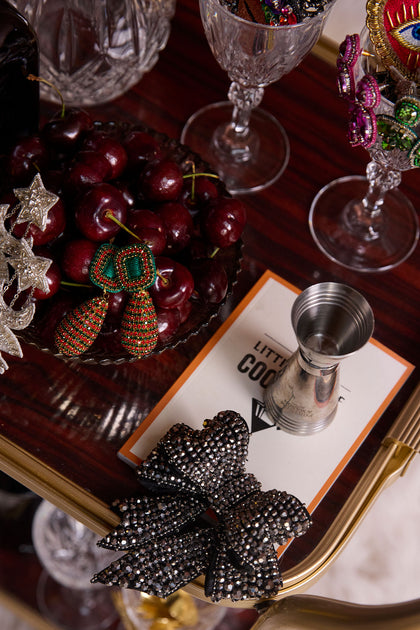Style & Life
Eat For The Environment with Scoop Wholefoods
Article By Sahara .
Apr 30, 2020
How to make your essentials shop more sustainable – we spoke with Stephie, co-founder of zero waste store Scoop Wholefoods on how to shop plastic and waste-free.
This summer will be characterised in history as a time of upheaval, but also of reflection. A collective realignment of priorities could have a profound effect on our world after this pandemic. We don’t know about you, but we are thinking a lot more about health – our own and the Earth’s. The world’s leading scientists are highlighting the increasing impact on the environment of the food we eat and how it adds to climate change. And thus, we are presented with the motivation and opportunity to learn how we can make improvements to our food choices by shopping for the benefit of our bodies, minds, and environment.
Searching for local produce, options free of single-use plastic, and recipes created with seasonality in mind can often feel like swimming upstream - that’s where Scoop Wholefoods UK founders Stephie and Rich come in. Inside their two wonderful locations in Bristol and Bath you can find everything from zero waste grains, cupboard essentials, freshly made nut butters, kombucha, sweet treats and in-house ground coffee, to household cleaning supplies and endless plastic-free, natural beauty products.
With an ethos of, “improving people’s’ health and well-being, and safeguarding our planet for future generations” we couldn’t resist catching up with Stephie and Rich to delve into their invaluable experience with food sustainability.
*If you live in the Bristol or Bath areas you can take advantage of their new delivery and click & collect service.

What role did sustainability play in your life prior to starting Scoop Wholefoods? Have you always been as passionate about the issue?
Both Rich and I had always been conscious of protecting the environment. We were both brought up in primarily vegetarian homes and grew up eating lots of home-cooked, natural wholefoods. As I am originally from Malta, like many other islanders can confirm, the damage to the environment is especially visible. I grew up seeing so many of Malta’s beautiful beaches choked in plastic waste which always really bothered me. In recent years there has also been so much in the media about global warming and the irreversible damage we are causing our planet, so Rich & I wanted to do something to create a positive contribution to this cause rather than being a part of the problem.

What are some of the key lessons you’ve learned while starting the business?
One of the most rewarding parts of setting up this business is being able to collaborate with so many passionate local suppliers. Once we started attending local markets, we quickly discovered that there are so many lovely producers that shared the same values as us and are working hard to produce fantastic local products. I am so happy that we have managed to work with so many of them and can showcase their produce in our shops.
It has also been so rewarding to hear such positive feedback from our customers, who like ourselves were desperate to find a convenient yet sustainable shopping experience.
What are the benefits of shopping locally and sustainably?
They are endless. First of all, you reduce the amount of energy and carbon emissions that are required to transport the food itself, but besides that, you are helping support the British economy, British jobs and creating so many opportunities for people.
We have seen such an increase in the number of growers and producers popping up all over the place, many of whom are young, passionate entrepreneurs. It is so much more rewarding helping to support individuals’ dreams.
If someone doesn’t live near a Scoop Wholefoods, what can they do to be more environmentally conscious while food shopping?
So many zero-waste shops are popping up all over the place, so it would be great to shop at these types of stores where possible. Here are a few other things to try:
1. Try and shop at local farmers or artisan markets. There are so many of these across the country and they showcase the best of what each county has to offer. There are lots across London too.
2. Always try and buy products that contain the minimal amount of packaging, or at least in reusable packaging. For example, choosing veg that isn’t wrapped in plastic, buying larger bags of food, buying yoghurt in glass jars, etc etc.
3. Switching to a door-step milk delivery. This is a great way to reduce plastic waste and support local farmers.
4. Trying to reuse packaging as much as possible. Try and think of recycling as a last resort and it is so energy-intensive in itself.
5. Reducing the amount of meat and dairy that you consume and turning it into a special treat rather than an everyday staple.
6. Reduce food waste in general. This is the greatest contributor to improving your reduction in carbon emissions.

What are some of the key lessons you’ve learned while starting the business? What are some of the benefits of shopping and eating in this way that your customers have experienced?
Our customers are always so happy to be supporting local producers, so this is a great benefit.
Another benefit is the ability to buy as much or as little as they like without having pack sizes prescribed to them. We have all purchased a certain spice or ingredient for a particular recipe only to find the remaining 95% of the pack is still at the back of your cupboard a year later. At shops like ours, you can buy the exact amount you need which helps customers reduce food waste.
Customers can also try a small amount of lesser-known or slightly more unusual products without having to commit to an expensive large bag of something. We have heard from customers that this allows them to be more adventurous with their shopping and cooking.
What are some common ‘sustainability’ mistakes people make around food shopping?
I think one of the greatest misconceptions is that people believe that as long as food is purchased in recyclable packaging then they are doing their bit for the environment. Without going into all the science and data behind it, the amount of waste, especially plastic waste, that is recyclable is pretty low. The majority of it gets shipped off to landfills overseas and a lot of it ends up being leached into the oceans. Not to mention the amount of energy required to recycle waste that can be recycled.
We are strong believers in trying to reduce purchasing as much packaging as possible, and if possible, try and purchase food in biodegradable or compostable packaging. Reusing as much packaging as possible and leaving recycling as a last resort.
We are coming into the warmer months of summer, what seasonal produce should people keep their eyes out for?
We absolutely love this time of year as so much lovely UK grown produce becomes available. We also grow lots of veg ourselves in our garden and we are currently waiting for some lovely peas, broad beans, asparagus, kale and salad leaves to come through. We love pairing these fresh veggies with delicious whole grains, lentils, beans and fresh herbs.
What’s next for Scoop Wholefoods?
Our dream is to turn Scoop into a sustainable shopping alternative to a supermarket, so we are constantly looking for ways to expand our offering. We are working hard on continuing to establish strong relationships with growers and producers in our area so that together we can develop products for our customers to be able to continue delivering healthy, natural and organic foods and offering a convenient shopping experience.
We also hope to continue opening up more shops around the country. However, due to all that is currently going on our expansion plans may take a little longer than anticipated.

Lastly, with all the mouth-watering, healthy recipes on your site we can’t resist, do you have any favourite recipes that feature summer’s best produce and ingredients?
This has been the hardest question of all for me to answer, as I have too many favourite recipes! I have chosen this recipe that I recently created, which is a twist on a traditional Maltese recipe (which is where I am originally from).
Ingredients:
3 or 4 Peppers (any variety will do)
200g Freekeh*
100g Puy Lentils*
150g Purple sprouting broccoli
2 shallots
8-12 olives*
1 small preserved lemon*
2/3 tsp capers*
100g feta
1 tin of tuna (optional)*
Fresh mint
All ingredients marked with an * can be found at Scoop Wholefoods
Method:
Rub the peppers in a little olive oil and pop them in the oven at around 220 degrees for 15 minutes. They should be soft yet firm enough to stuff. Once they are cool enough to handle, simply pull the stalk off. This should remove all the seeds too.
Boil the Freekeh for 20-25 mins until tender. In a separate pan, sautee the shallots, dice the purple sprouting broccoli and add it in too. Cook until the broccoli is tender.
In the meantime, chop up all the remaining ingredients and mix them in a bowl. Add the freekeh and broccoli when they are done.
Stuff the peppers with the freekeh mixture and scatter some fresh mint on top.

Discover more recipes and follow their journey:
Website: uk.scoopwholefoods.com/
Instagram: @scoopwholefoods_uk
Facebook: ScoopWholefoodsUK
Order Online Here



